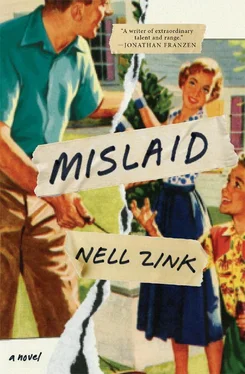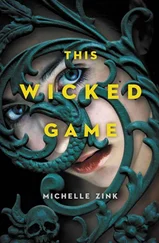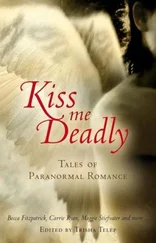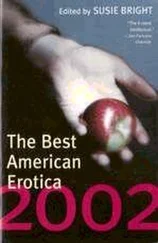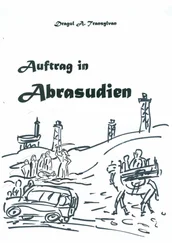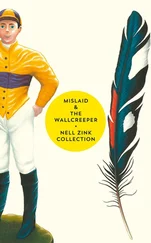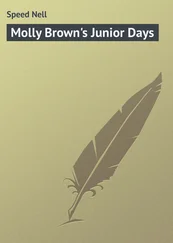To find her, all they had to do was find Temple. Luckily he was one of the more conspicuous people in Charlottesville.
A number of officers were assigned to track him down. It took them a while. He was still too headachy to endure his roommate or go to class. He slept for a good long while with his head down on a study carrel in the library and then moved to a sofa. Instead of his tennis sweater he was wearing an elegant blazer that had once belonged to the poet Mark Strand. A couple of times a security guard approached to rouse him, noticed the clothes, and let him lie.
“Run this by me again, Bird Dog,” Lee said to his son. “Why does it make any difference what underage slut gets gang-raped in your frat house? Where’s the novelty?”
“I’m saying, she was not a slut. She was a good kid. And Mike says I carried her home with an amount of drugs in her pocket that could get us all sent to prison.”
“So?”
“What if the police had stopped me? I don’t even know if it’s legal to carry girls around.”
“They didn’t stop you. They didn’t catch you. What are you so worried about?”
“You’re the one who checked me into a motel! What are you so worried about?”
Lee said, “I’m not worried. But we don’t talk to cops in our family. You’re too young to know that. We have a different level of access to the law.”
“What about the girl?”
“What about her?”
Byrdie remembered the note. “When I dropped her off, I left her a note.”
“You didn’t sign it, I assume.”
“I signed it as ‘Thetan Hegemon.’ ‘Byrd Fleming’ looks, I don’t know, kind of freighted. She was black. But so, so cute.”
Lee went to the refrigerator and got them each a beer. “Go on,” he said.
“I wanted her to be able to find me if she wanted. I thanked her for an interesting evening,” he said.
“Jesus, Byrd,” Lee said. He pulled out his address book and added, “I’m going to put you on the phone with your uncle Trip, because this is way over my head.”
BTF III, Esq., had been in politics only very briefly when a scandal in the 1970s earned him an unelected appointment, but he still had some pull, and Byrdie told him the story: Mike, his housemate and brother, had returned from a police interrogation telling all and sundry that he had nobly covered up Byrdie’s crimes. Those crimes were possession of an amount of acid large enough to suggest dealing and a black woman small enough to suggest an age of around fifteen. Both were Mike’s crimes, but that didn’t seem to penetrate Mike’s awareness. In his own mind, he had handed off his crimes in a lateral pass when Byrdie relieved him of the victim and — unwittingly — the drugs. Byrdie feared that transporting a drugged girl laden with drugs might be construed as smuggling. In related news, he had assaulted his accusers with a long, heavy sword.
Trip said, “You’re fucked. Bend over like you mean it.”
“How do I do that?”
“Go down to the station and say hello. Then don’t say another word. That’s the hard part. You’re going to think you can manipulate them, because they’re going to be such obligate jackasses, but pride goeth before a fall. Never, ever give in to the temptation to tell them what really happened. If it conflicts with their theories, they’ll take it out on you. Make them think, and they’ll want revenge. Your job is to sit tight while I play my hand. It’ll be interesting, making a neat tidy felony case out of this, fit for circuit court.”
“Could you repeat all that to Dad?” He handed the receiver to Lee.
“I wish you could see what Byrdie has on,” Lee told Trip. “A rainbow shirt and a black girdle. He looks ready to sell his tail end on Ninth Avenue.”
Byrdie looked down and said, “These are bike shorts!”
“I can see his fundament,” Lee continued.
“This shirt is Deadhead, not gay pride,” Byrdie said pointedly. “It’s batik!”
“Go out now and buy him some trousers,” Trip advised, cackling.
“But why? They might not even take him into custody.”
Byrdie had already peeled off the shorts. He handed them to Lee and requested his pants and shirt.
Lee drove him to the police station in town and announced his presence. Byrdie stood contritely, looking at the floor, a guilty schoolboy. A routine book-and-release on his own recognizance, with an appointment to come back the next week to be arraigned on felony hard-drug-dealing charges to be determined in circuit court by a grand jury. They guessed bail wouldn’t be set too high, and that his lawyer should bring his checkbook.
“See?” Lee said, cradling his genitals for safety as he sat down in the car. “That wasn’t so bad. Trip will pull some strings and get the charges expunged. No need to fuss and fret. I really do love these pants. Comfiest I ever had on.”
“Keep them, Dad. My gift to you.”
“And if you can’t move out of that house full of pizza-face losers, at least exclude me from your future shenanigans. Let Trip handle this shit from now on. It depresses me no end.”
Byrdie settled in at the motel for a few days. Criminality was the kind of novel experience he felt he would be best able to handle with salty snacks and daytime television.
He was glad to be away from the house. He imagined an obsequious uproar. All the brothers excited by official attention, flattered by interrogations, reenacting hard-boiled noir movies. Jabbering hoarsely about the need to protect themselves, about what should be done with stool pigeons, about who had known what when. Presenting a united front, looking to their fugitive hegemon for leadership. He realized how wrong he might be. Suddenly he found them all immensely irritating.
He would have liked to send for his girlfriend, but his stress levels made him hesitate. Her presence would have necessitated talking to her. So much for burritos and Night Court . She was such a good girlfriend. But he felt no longing. He wondered instead how he could warn Shadow.
He wrote her a postcard from the lobby, in care of her dorm room. “The police were there. Be careful!” he wrote. He couldn’t think of anything else to say that wouldn’t be incriminating to one or the other or both of them. He didn’t sign it at all. He assumed she would remember his handwriting from the earlier note and draw her own conclusions.
It was too succinct. Karen had been nursing a crush on him, but that two-sentence letter killed it. She didn’t think she had been warned by a friend. She thought, This is a threat from an asshole drug dealer in trouble who thinks I might fink!
So far the prosecutor knew one thing for certain about Shadow: she had twelve hits of acid. She might have been a sexual assault victim, too, in theory, but time to prove that was running out. So she was trading sex for drugs. Not in reality — reality wasn’t directly relevant — but in the case he might make against Byrdie. Shadow could be Byrdie’s acid whore. Like a crack whore, only with acid.
He turned the thought over in his mind and realized his equation didn’t quite hold, because acid isn’t addictive. Her motive would have to be money. Money is as addictive as air. “Shadow” could be a prostitute’s nom de guerre. .
The prosecutor wasn’t asking for much — just guilt beyond a reasonable doubt and a courtroom free of conflicting information. He wasn’t anybody’s nemesis! He had nothing against Byrdie or Shadow, either one! He just needed to put away some criminals for his résumé.
“Acid whore,” he said aloud, rehearsing for the newspapers. “A so-called fraternity house where a drug lord lured a penniless local girl. .” Decency forbids further reproduction of his shameful imaginings.
Читать дальше
Конец ознакомительного отрывка
Купить книгу
